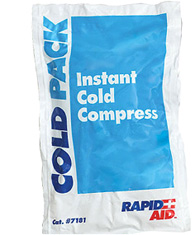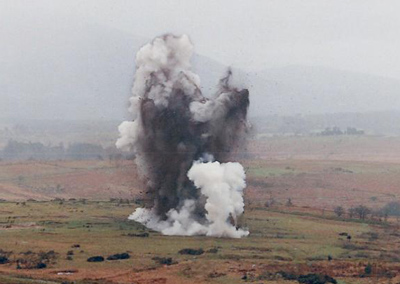Energy Gains and Losses
Chemical reactions always involve a change in energy. Note that while energy can be neither created nor destroyed in a chemical reaction, it can be transferred. Chemical reactions either absorb energy or give off energy and are classified respectively as either endothermic or exothermic.
An endothermic reaction is one that absorbs heat. The word "endothermic" comes from the Greek words endo meaning "within" and thermic meaning "heat." These reactions absorb heat from the surroundings and need that heat in order to occur. Perhaps you have seen cold packs or instant cold compresses like the one shown below. They look like a just plastic bag filled with liquid, but when you strike it against the countertop and shake it, it gets extremely cold. What’s going on?

A cold pack is filled with ammonium nitrate crystals and water. The ammonium nitrate crystals are kept inside a tube within the plastic bag. When you strike the bag and shake it, you break that inner tube and release the ammonium nitrate crystals. They then combine with the water in an endothermic chemical reaction. While the reaction takes place, heat is absorbed from the surroundings. The bag and the water lose heat and feel cold to the touch.

The opposite of an endothermic reaction is an exothermic reaction. Exothermic reactions give off heat instead of absorbing heat. An explosion is the most dramatic example of an exothermic reaction. In an exothermic reaction, the energy needed to make the reaction take place is less than the amount of energy given off. That excess energy is usually given off as heat. Some of it may also be given off as light and sound. The combustion of fuels such as wood or coal is another example of an exothermic reaction. Since an exothermic reaction is the opposite of an endothermic reaction, it can be used in a heat pack. In a heat pack, an exothermic reaction takes place instead of an endothermic one, and heat is produced instead of absorbed.